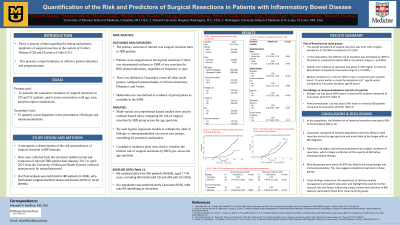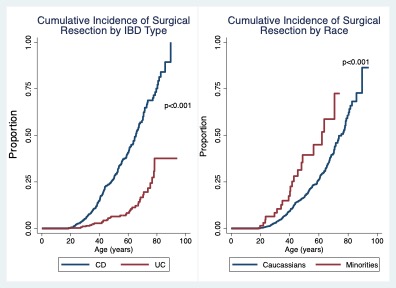Monday Poster Session
Category: IBD
P2554 - Quantification of the Risk and Predictors of Surgical Resections in Patients With Inflammatory Bowel Disease
Monday, October 28, 2024
10:30 AM - 4:00 PM ET
Location: Exhibit Hall E

Has Audio
- EK
Elizabeth Karanja, BSc
University of Missouri School of Medicine
Columbia, MO
Presenting Author(s)
Elizabeth Karanja, BSc1, Serena Crawford, BSc1, Mustafa Gandhi, MD2, Kwame Frimpong, MD1, Hayford Frempong, MS1, Nitish Nandu, MD1, Benedicta Arhinful, MD, MPH, DrPH3, Liridon Zguri, MD4, Harleen Chela, MD1, Yezaz Ghouri, MD1, Maxwell A. Barffour, MD, PhD5
1University of Missouri School of Medicine, Columbia, MO; 2University of Missouri Health Care, Columbia, MO; 3Howard University Hospital, Washington, DC; 4University of Missouri School of Medicine-Columbia/Mercy Hospital Springfield, Columbia, MO; 5Washington University School of Medicine in St. Louis / Barnes-Jewish Hospital, Columbia, MO
Introduction: There is paucity of data regarding the timing and primary predictors of surgical resection in the context of Crohn’s Disease (CD) and Ulcerative Colitis (UC). This presents a major hinderance to effective patient education and prognostication. This study is an attempt to quantify the cumulative incidence of surgical resections in CD and UC patients, and to assess associations with age, race and prescription medications.
Methods: Our study population included a cohort of CD and UC patients managed by gastroenterologist at the University of Missouri Health System, from Jan, 2017, through April, 2022. Data on demographics, disease type, medications and history of surgical resections (including small bowel resections, colectomy and proctectomy) were retrieved from the electronic medical records. Kaplan-Meier cumulative incidence plots were used to quantify the resection rates across the age spectrum, and to assess disparities by disease type and race. Cox proportional hazard models we used to estimate risk of resections for patients on different medical regimens.
Results: Our patients (N=834), aged 17-94 years, were predominantly Caucasian (92%), with 55% having CD and 35% with UC. Overall prevalence of surgical resection was 25%, with a higher prevalence in CD (38%) compared to UC (9%). Life-time risk of resection was estimated at >90% in CD patients, compared to about 40% in UC patients (figure 1, p< 0.001). Overall, incidence of resections were about 5-20% higher in minority patients compared to Caucasians (Figure 2, P< 0.001). Median incidence age (i.e. age by which 50% of patients would have had at least one resection) was estimated at 65 years and 80 years for Minorities and Caucasians respectively. Finally, Patients on biologics were ~3 times more likely to require surgical resection (p< 0.001), whereas those on immunomodulators were about 55% more likely to require a resection (p=0.006).
Discussion: In this population, lifetime risk of intestinal resection was estimated at about 90% in CD and about 40% in UC. Caucasian compared to minority populations were less likely to need resection across the age spectrum, and more likely to live longer with the disease. The higher incidence of resections in patients on immunosuppressive therapy likely reflects a severe disease stage prior to treatment initiation. These findings underscore the importance of tailored patient education in the management CD and UC.

Note: The table for this abstract can be viewed in the ePoster Gallery section of the ACG 2024 ePoster Site or in The American Journal of Gastroenterology's abstract supplement issue, both of which will be available starting October 27, 2024.
Disclosures:
Elizabeth Karanja, BSc1, Serena Crawford, BSc1, Mustafa Gandhi, MD2, Kwame Frimpong, MD1, Hayford Frempong, MS1, Nitish Nandu, MD1, Benedicta Arhinful, MD, MPH, DrPH3, Liridon Zguri, MD4, Harleen Chela, MD1, Yezaz Ghouri, MD1, Maxwell A. Barffour, MD, PhD5. P2554 - Quantification of the Risk and Predictors of Surgical Resections in Patients With Inflammatory Bowel Disease, ACG 2024 Annual Scientific Meeting Abstracts. Philadelphia, PA: American College of Gastroenterology.
1University of Missouri School of Medicine, Columbia, MO; 2University of Missouri Health Care, Columbia, MO; 3Howard University Hospital, Washington, DC; 4University of Missouri School of Medicine-Columbia/Mercy Hospital Springfield, Columbia, MO; 5Washington University School of Medicine in St. Louis / Barnes-Jewish Hospital, Columbia, MO
Introduction: There is paucity of data regarding the timing and primary predictors of surgical resection in the context of Crohn’s Disease (CD) and Ulcerative Colitis (UC). This presents a major hinderance to effective patient education and prognostication. This study is an attempt to quantify the cumulative incidence of surgical resections in CD and UC patients, and to assess associations with age, race and prescription medications.
Methods: Our study population included a cohort of CD and UC patients managed by gastroenterologist at the University of Missouri Health System, from Jan, 2017, through April, 2022. Data on demographics, disease type, medications and history of surgical resections (including small bowel resections, colectomy and proctectomy) were retrieved from the electronic medical records. Kaplan-Meier cumulative incidence plots were used to quantify the resection rates across the age spectrum, and to assess disparities by disease type and race. Cox proportional hazard models we used to estimate risk of resections for patients on different medical regimens.
Results: Our patients (N=834), aged 17-94 years, were predominantly Caucasian (92%), with 55% having CD and 35% with UC. Overall prevalence of surgical resection was 25%, with a higher prevalence in CD (38%) compared to UC (9%). Life-time risk of resection was estimated at >90% in CD patients, compared to about 40% in UC patients (figure 1, p< 0.001). Overall, incidence of resections were about 5-20% higher in minority patients compared to Caucasians (Figure 2, P< 0.001). Median incidence age (i.e. age by which 50% of patients would have had at least one resection) was estimated at 65 years and 80 years for Minorities and Caucasians respectively. Finally, Patients on biologics were ~3 times more likely to require surgical resection (p< 0.001), whereas those on immunomodulators were about 55% more likely to require a resection (p=0.006).
Discussion: In this population, lifetime risk of intestinal resection was estimated at about 90% in CD and about 40% in UC. Caucasian compared to minority populations were less likely to need resection across the age spectrum, and more likely to live longer with the disease. The higher incidence of resections in patients on immunosuppressive therapy likely reflects a severe disease stage prior to treatment initiation. These findings underscore the importance of tailored patient education in the management CD and UC.

Figure: Cumulative Incidence of Surgical Resections by IBD type and Race.
Note: The table for this abstract can be viewed in the ePoster Gallery section of the ACG 2024 ePoster Site or in The American Journal of Gastroenterology's abstract supplement issue, both of which will be available starting October 27, 2024.
Disclosures:
Elizabeth Karanja indicated no relevant financial relationships.
Serena Crawford indicated no relevant financial relationships.
Mustafa Gandhi indicated no relevant financial relationships.
Kwame Frimpong indicated no relevant financial relationships.
Hayford Frempong indicated no relevant financial relationships.
Nitish Nandu indicated no relevant financial relationships.
Benedicta Arhinful indicated no relevant financial relationships.
Liridon Zguri indicated no relevant financial relationships.
Harleen Chela indicated no relevant financial relationships.
Yezaz Ghouri indicated no relevant financial relationships.
Maxwell Barffour indicated no relevant financial relationships.
Elizabeth Karanja, BSc1, Serena Crawford, BSc1, Mustafa Gandhi, MD2, Kwame Frimpong, MD1, Hayford Frempong, MS1, Nitish Nandu, MD1, Benedicta Arhinful, MD, MPH, DrPH3, Liridon Zguri, MD4, Harleen Chela, MD1, Yezaz Ghouri, MD1, Maxwell A. Barffour, MD, PhD5. P2554 - Quantification of the Risk and Predictors of Surgical Resections in Patients With Inflammatory Bowel Disease, ACG 2024 Annual Scientific Meeting Abstracts. Philadelphia, PA: American College of Gastroenterology.
